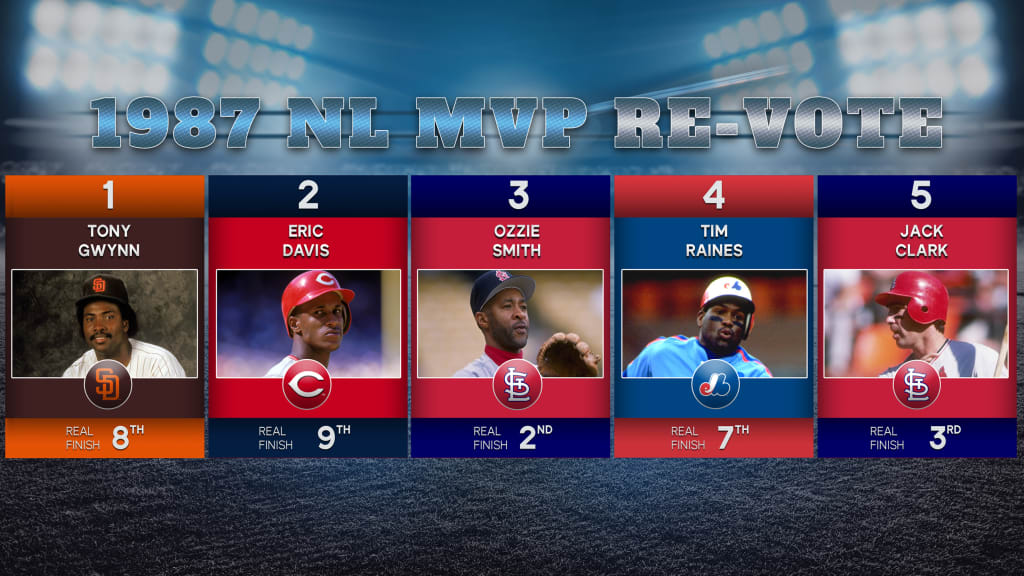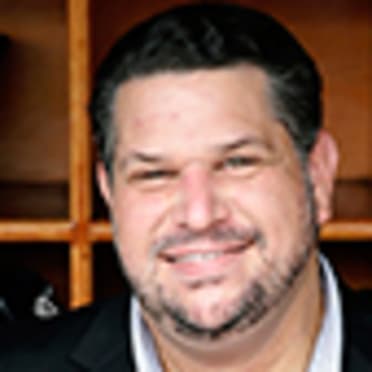
Should a player on a last-place team win a Most Valuable Player Award?
That question had never been put to the test during the first 56 years of voting by the Baseball Writers' Association of America, which has been handing out the MVP Awards since 1931.
In 1987, the answer was yes.
Andre Dawson was voted the National League MVP that season despite the Cubs’ last-place finish in the NL East. Dawson’s power numbers were impressive -- he led the league with 49 home runs and 137 RBIs -- though home runs were hardly a novelty that season.
Not only was 1987 the first campaign in history with more than 4,000 home runs across the Majors, but the league-wide total of 4,458 obliterated the record of 3,813, which was set in the previous season.
Dawson’s power numbers jumped off the page to voters, who were not dissuaded by his team’s losing season. Dawson wasn’t the first player on a losing team to win MVP honors -- Ernie Banks won the NL MVP in 1958 and ’59 despite the Cubs’ sub-.500 records -- but he was the first to win the award while finishing last.
(The only other player since 1987 to win an MVP on a last-place team is Alex Rodriguez, who won the 2003 AL MVP on a basement-dwelling Rangers club.)
MOST VALUABLE PLAYERS FROM LOSING TEAMS
NL Ernie Banks, 1958 Cubs (72-82)
NL Ernie Banks, 1959 Cubs (74-80)
NL Andre Dawson, 1987 Cubs (76-85)*
AL Cal Ripken, 1991 Orioles (67-95)
AL Alex Rodriguez, 2003 Rangers (71-91)*
AL Mike Trout, 2016 Angels (74-88)
AL Mike Trout, 2019 Angels (72-90)
* indicates last-place finish
The 1987 NL MVP vote has been one of the most maligned in the BBWAA’s award history, though the objection to Dawson as the league MVP hasn’t always been about the Cubs’ woeful season.
Should Dawson have won the award? And if not, who should have?
In an effort to see whether justice was served, MLB.com gathered 17 of its writers to re-vote on the award with the benefit of hindsight. Knowing what we know today about the way players are valued, would the results differ?
The scoring used was the same as the BBWAA’s: A first-place vote is worth 14 points. From second through 10th, the ballot spots are worth 9-8-7-6-5-4-3-2-1 points, respectively. And to keep the re-vote based somewhat in the reality of 1987, voters were only allowed to consider the 19 players who received MVP votes that year.
The real top 5
- Andre Dawson, RF, CHC
- Ozzie Smith, SS, STL
- Jack Clark, 1B, STL
- Tim Wallach, 3B, MON
- Will Clark, 1B, SF
The “new” top 5
- Tony Gwynn, RF, SD
- Eric Davis, CF, CIN
- Ozzie Smith, SS, STL
- Tim Raines, LF, MON
- Jack Clark, 1B, STL
THAT WAS THEN ...
While Dawson’s power numbers paced the league, his .328 on-base percentage ranked 43rd in the NL. However, he did have narrative force behind him as well, as this was the year that he famously told the Cubs he’d play for whatever the club wanted to pay him, and then proceeded to lead the league in homers. That said, his 3.5 WAR (per FanGraphs) was tied for 23rd among position players. Twelve players in the NL posted a FanGraphs WAR of at least 5.0, while 11 also had an OBP of .390 or higher. Dawson received 11 of 24 first-place votes, 11 seconds and two thirds, finishing a comfortable 76 points ahead of Ozzie Smith.
Smith hit .303 with a .392 OBP, 75 RBIs and 43 steals (and, of course, incredible defense at shortstop), though Smith’s candidacy wasn’t unanimously viewed as obvious; he received nine first-place votes, one second and two thirds, yet he was also left off two ballots entirely.
Jack Clark, Smith’s St. Louis teammate, was having an MVP-caliber season before an ankle injury limited him to just three games after Sept. 9, though he still finished third in the vote. Clark earned three first-place votes, finishing only seven points behind Smith.
Tim Wallach and Will Clark rounded out the top five, as both had strong seasons for 90-win teams in Montreal and San Francisco, respectively.
BIGGEST GAINERS IN THE RE-VOTE
Those who believe that Dawson shouldn’t have won the MVP will feel vindicated by the re-vote, but the results might spark an even bigger debate.
Tony Gwynn -- who played for a 65-win Padres team that finished with the worst record in the NL -- won a close race in the re-vote, edging Eric Davis of the Reds by a mere seven points.
Gwynn and Smith received four first-place votes apiece, while Davis and Jack Clark each received three. Tim Raines had two first-place votes and Darryl Strawberry received the other.
Gwynn – who finished eighth in the actual 1987 vote -- led the NL with a 7.4 fWAR, a .370 average and 218 hits, finished second in OBP (.447) and stolen bases (56), fourth in runs scored (119) and was one of 14 players with a slugging percentage above .500. He was named on all 17 ballots, earning top-two status on 10 of them.
Davis, who finished ninth in the actual vote, hit 37 home runs with 100 RBIs, 120 runs scored, 50 stolen bases, a .991 OPS and a 7.1 fWAR, second only to Gwynn. Davis also played Gold Glove defense in center field for the Reds, who finished second in the NL West. Like Gwynn, Davis appeared on all 17 ballots, named in the top three on 11.
Raines rose from seventh in 1987 to fourth in the re-vote, as the Hall of Famer joined Gwynn, Davis, Jack Clark and Dale Murphy (who climbed from 11th to 6th) as the only players named on all 17 ballots.
BIGGEST FALLERS IN THE RE-VOTE
Dawson, Jack Clark and Will Clark were the only players named on every ballot back in 1987, yet all three fell in the re-vote.
Dawson was named on 15 of 17 ballots, though he received no first-place votes, one second and two thirds, with five of his votes coming at No. 10.
Just as he was in the actual vote, Smith was left off two ballots entirely. The Wizard fell from second to third, though his four first-place votes matched Gwynn for the most of any player.
Wallach and Will Clark, who finished fourth and fifth in the vote in 1987, didn’t fare as well in the re-vote. Wallach (10th place) appeared on only six ballots, only one as high as fifth place. Clark (11th), who paced a Giants team that won the NL West, was named on eight of the 17 new ballots, though none had him listed higher than seventh.
WHAT HAVE WE LEARNED?
The Cubs’ last-place finish apparently wasn’t the primary objection for the anti-Dawson crowd, as Gwynn’s Padres won 11 fewer games than the Cubs and had the second-worst record in the Majors (only the 61-win Indians were worse).
But Gwynn’s season was statistically superior in nearly every category aside from homers and RBIs, allowing him to emerge victorious in the re-vote despite San Diego’s dreadful season.
Gwynn finished his career with eight batting titles, five Gold Gloves, seven Silver Sluggers and 15 All-Star appearances, cruising into the Hall of Fame in 2007 with 97.6% of the vote. But the Padres legend retired without an MVP Award, never even earning a top-five finish after his third-place showing in 1984.
The 1987 season was Gwynn’s best shot at an MVP Award, and although Dawson slugged his way to the honor, there’s a solid argument to be made that a different player from a last-place team should have taken home the hardware.
